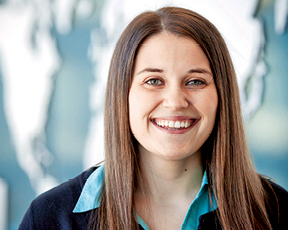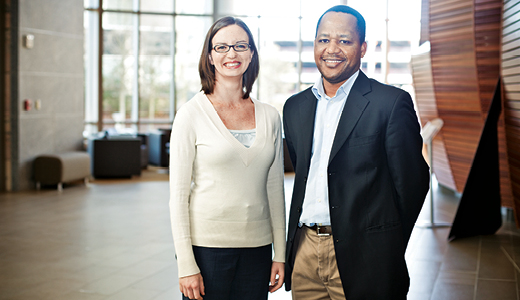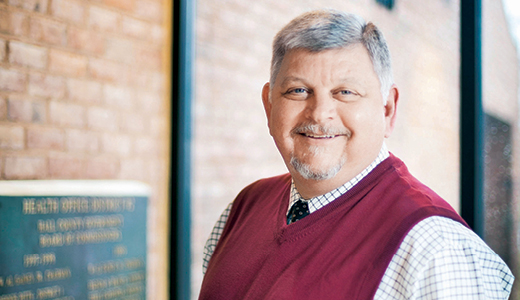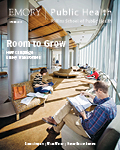Preparing Engaged Leaders
Scholarships help students follow diverse paths to improve health
The Rollins School of Public Health prepares students to change lives through improved health. Students are attracted to Rollins by the promise of hands-on experience that is relevant to current problems and the opportunity to be part of a community that works together to create solutions. Scholarship gifts to Campaign Emory help students, like those featured here, pursue life-changing work locally and globally.
By Sally Wolff King 79G 83PhD

In Uganda, Jacqueline Cutts founded a nonprofit to promote safe motherhood.
Dean's Council Scholars — Building on life experiences
Before enrolling at Rollins last fall, Dean's Council Scholar Jacqueline Cutts founded SAFE (Safe Mothers, Safe Babies), a nonprofit organization in Uganda.
Her scholarship, supported by the RSPH Dean's Council—an advisory body of business and community leaders—to help cover tuition, has allowed her to continue studying the effect of electricity, especially the absence of it, on birth outcomes in Uganda. She installed "Solar Suitcases" in hospitals, including those with no electricity. Without the solar units, doctors often cannot see clearly enough to detect complications, perform urgent surgeries, identify and stop bleeding, and address other problems.
Cutts is now analyzing data from her experiment to gauge impact. Her preliminary findings suggest that the installation of solar electricity led to a 35% increase in monthly delivery of babies.
An Idaho native who majored in political science at Vassar College, Cutts worked for four years with SAFE before applying to the MPH program at Rollins. She chose the RSPH because of its strong sense of community and mentoring.
 |
|
Johanna Chapin managed health-related projects for two organizations in Honduras |
"Roger Rochat, professor of global health, reached out to me when I was in the deciding phase," Cutts says. "I had the sense that he would provide professional mentoring. I would be more of a person here and part of a community and not just a number or a random face in a group of people. I also met students here who were interested in the same topics as I am. Rollins enables students to interact with professors as well as with students."
The Dean's Council Scholarship "has helped astronomically," Cutts says, to realize her goal of assisting people in developing countries. "It has been important to me to learn a skill and have it be meaningful."
Johanna Chapin, a fellow Dean's Council Scholar, has conducted her share of meaningful work in the field of public health. Two weeks after receiving her undergraduate degree in public health at Johns Hopkins, Chapin departed for Honduras to work with Siempre Unidos, a group of medical providers, counselors, pastors, and business leaders who offer medical care and prevention services to contain the HIV/AIDS epidemic. She served as project manager and also trained people with HIV in jewelry making. Some of her students now own jewelry businesses and can pay for their medications and support their families.
Chapin also worked with Global Brigades, a student-led nonprofit that seeks to empower communities in developing countries to improve quality of life and environment. Through its work in Honduras, Global Brigades provides medical, dental, and public health services as well as health education, sustainable safe water, and microfinance loans for agricultural projects. In her work with this group, Chapin created a research and evaluation program to measure the impact of its programs more accurately.
After her Honduran experiences, Chapin sought further education and training in quantitative methods in research and chose to enroll at Rollins. The Wisconsin native will receive her MPH in global epidemiology in May.
"The quality of the people and the projects here interested me," she says. "The research on HIV and in methods training is what drew me here."
Since coming to Rollins, she has participated in "Involvement" and "The Man Project," two HIV studies that consider racial disparities among men who have sex with men and specifically ask why African Americans in this category are at higher risk for HIV than whites. She would like to begin a doctorate to continue researching HIV prevention for high-risk populations.
"The Dean's Council Scholarship is wonderful recognition of the work that I had been doing and of the future public health work that I seek to do," Chapin says. "Rollins provided the opportunity for me to get a quality education. I've gained strong quantitative methods training in epidemiology, and that has allowed me to apply the skills I'm learning in the classroom to the problems I have encountered in the field. The scholarship allowed me to engage specifically in the work that I wanted to do."
Watch this video to learn how Jacqueline Cutts is making childbirth safer in Uganda by introducing solar light units in hospitals: bit.ly/safemothers-babies. |
||
Livingston Fellows — Advancing science in mental health and malaria
In 2011, the Livingston Foundation of Atlanta awarded its first scholarships for PHD students at Rollins.
The foundation gave two new scholarships in 2012 to help Elizabeth Walker 08MPH and Joseph Njau 13PhD (pictured above) advance their doctoral research.
Walker received a Livingston Fellowship and a C. Randolph Jones Award to support research and development activities related to her studies in behavioral science and health education. Her dissertation considers how family and social support alleviates depression and promotes self-management in people with epilepsy. Her awards helped her purchase a laptop computer with specialized software for data analysis and present her research at the annual conference of the American Public Health Association in San Francisco last fall.
A native of Rochester, New York, Walker taught middle school in Baltimore, Maryland, with Teach for America before enrolling as an MPH student at Rollins in 2006. She plans to become a researcher and teacher after completing her PhD. Her goal: to teach public health courses related to mental health and research methods.
"I am grateful to both donors for supporting doctoral students at Rollins," says Walker. "It really means a lot to us and our research."
Livingston Fellow Joseph Njau of Tanzania agrees. His scholarship enabled him to purchase hardware and software for analyzing data on the economics of malaria. "The computer helped me analyze my data for my first paper, which I recently submitted for publication, and allowed me to begin work on the second and third papers," he says. "I could not have done so without it."
Njau came to the United States as a William H. Foege Fellow in Global Health at Rollins. Established in 2003 with funding from the Bill & Melinda Gates Foundation, these fellowships support students from developing countries who wish to study and network at Rollins. Njau, who will graduate in May with a PhD in health services research and policy, aspires to continue working with institutions and individuals committed to reducing the global burden of malaria and neglected tropical diseases worldwide. Through research and teaching, he plans to increase the number of health economists who focus on diseases of greatest burden in sub-Saharan Africa and Tanzania in particular.
"My experience at Emory couldn't have been better," he says. "I would not have learned this much if I had stayed in Africa, or even Europe, for that matter." Before studying at Rollins, "I could see no relationship between real-life challenges and what I was learning, but here the primary goal is to focus on the problems of today. Learning theory here is geared toward addressing real-life problems. That gives me the confidence to say, ‘Yes, I can do this.' The program challenged me to think and be innovative in finding solutions to current public health problems."
Georgia Health Foundation Scholars — A new way of learning
Dave Palmer 11CMPH (pictured above) had been out of school for 28 years before enrolling in the Career Master of Public Health (CMPH) program at Rollins.
"I have three boys—college aged—and I could not have gone back to school without my scholarship," says Palmer, who benefitted from a grant from the Georgia Health Foundation (GHF). Rollins matches the grant to provide full tuition for students in the CMPH program, the school's distance learning program for working professionals.
Prior to enrolling in the program, Palmer worked for seven years as a state public health information officer. Today he serves in that role with the Emergency Preparedness and Response program in Northeast Georgia. He covers 13 counties in his health district, based in the Gainesville, Georgia, office where physician Dave Westfall 09CMPH is the district health director with the Georgia Department of Health. Like Palmer, Westfall is a GHF scholarship recipient and now teaches health care management to CMPH students in the classroom and online.
"The online experience was new to me," says Palmer, who earned an undergraduate degree in journalism at the University of Georgia in 1981. "I was a traditional student who attended school in the classroom. So online learning was different. It took me a while to understand the tools, but once I did, it was an easy path."
His CMPH degree broadened his understanding of public health in general and his knowledge of policies, objectives, and initiatives in the community. "I learned how to communicate to the public and educate people about health conditions and about our mission to help people," he says.
He also learned how to take a positive approach to improve their health through prevention and public preparedness. Tobacco cessation is one example. "We talk to people in communities to explain to them the medical and financial reasons for why it is best to stop smoking," he says. "We tell them, ‘You will feel better, breathe better, and spend a lot less money.' "
Palmer's degree has enhanced his professional life in other ways. "I have a better understanding of policy," he says. "Now I look at public health issues at the state and federal level as well as at the county and local level. I can better explain data to reporters and public health to others. From the courses I took at Rollins, I learned much that we can utilize in our current work to enhance the safety and well-being of citizens in Northeast Georgia."



